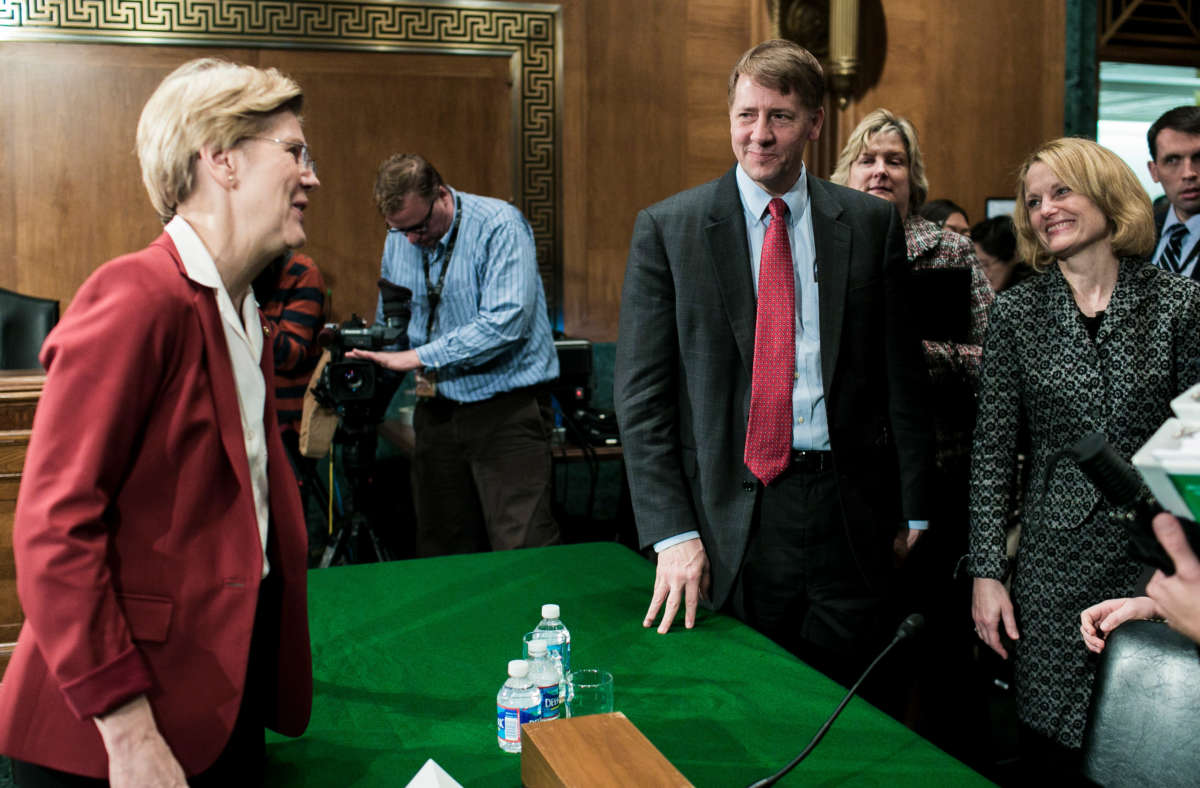Richard Cordray, a former director of the Consumer Financial Protection Bureau (CFPB), has been selected to serve as the chief operating officer of Federal Student Aid within the Department of Education — a move that many will likely see as a positive development for the canceling of student loans for debtors across the country.
Cordray is set to oversee a $1.6 trillion portfolio of student loans and other financial aid programs in his new role. His appointment, which does not require Senate approval, was announced on Monday by Education Secretary Miguel Cardona.
As former attorney general for the state of Ohio and as head of the CFPB, Cordray has a history of tackling issues that have created economic burdens for millions of Americans. But it’s his friendship with Sen. Elizabeth Warren (D-Massachusetts) that piques people’s interest.
According to reporting from The New York Times, which cited administration officials familiar with the subject, Cordray and Warren (who first proposed the creation of the CFPB) “maintain a close relationship” with one another. That relationship has caused some to speculate on whether Cordray shares her values when it comes to canceling student debt — Warren has been an ardent proponent of canceling up to $50,000 of federal debt per borrower in the U.S., much higher than the amount President Joe Biden has talked about in the past.
Biden has said he is in favor of canceling $10,000 per debtor, and has suggested that canceling higher debt amounts would benefit those whom he believes may not need such relief — people who went to “Harvard and Yale and Penn,” as he once said.
But Warren, joined by many other Democrats in Congress, believes $50,000 in debt cancelation per borrower is the better path to take, and is pushing Biden to take that route, both as a morally sound policy and as a booster to the nation’s economy.
“By cancelling up to $50,000 in federal student loan debt for borrowers, President Biden can take the single most effective executive action available to provide a massive stimulus to our economy, help narrow the racial wealth gap, and lift this impossible burden off of tens of millions of families,” Warren said earlier this year.
The pressure may be working. Members of the Biden administration have signaled in recent months that he’s open to other ideas on student debt, including using his executive authority to wipe debt clean with the stroke of a pen, a move he once was skeptical of making because his preference was for Congress to pass a bill on debt cancellation for him to sign.
“[Biden] asked his secretary of education … to have his department prepare a memo on the president’s legal authority” to do that, Biden’s chief of staff Ron Klain said in an interview in late March. “Hopefully, we’ll see that in the next few weeks. And then he’ll look at that legal authority, he’ll look at the policy issues around that, and he’ll make a decision.”
With Cordray’s appointment, it’s now looking closer than ever that Biden may be opening up to the idea of a bigger loan forgiveness program as well — especially given how Warren reacted to the news on Twitter.
“@RichCordray was a fearless @CFPB leader who forced big financial institutions to return $12 billion to people they cheated,” Warren wrote. “I’m very glad he’ll be protecting student borrowers and bringing much-needed accountability to the federal student loan program.”
.@RichCordray was a fearless @CFPB leader who forced big financial institutions to return $12 billion to people they cheated. I’m very glad he’ll be protecting student borrowers and bringing much-needed accountability to the federal student loan program. https://t.co/KvwcD2afMW
— Elizabeth Warren (@SenWarren) May 3, 2021
Cordray himself has warned against reading too much into his appointment, however, saying it’s too soon to view his new role as meaning one thing or another when it comes to student debt cancelation.
“My voice will be part of [the student loan debate], but let’s not get ahead of ourselves on that for now,” he said.
But in a different statement, Cordray recognized that he would be tasked with addressing the issue, and noted that he was looking forward to working to “create more pathways for students to graduate and get ahead, not be burdened by insurmountable debt.”
Thank you for reading Truthout. Before you leave, we must appeal for your support.
Truthout is unlike most news publications; we’re nonprofit, independent, and free of corporate funding. Because of this, we can publish the boldly honest journalism you see from us – stories about and by grassroots activists, reports from the frontlines of social movements, and unapologetic critiques of the systemic forces that shape all of our lives.
Monied interests prevent other publications from confronting the worst injustices in our world. But Truthout remains a haven for transformative journalism in pursuit of justice.
We simply cannot do this without support from our readers. At this time, we’re appealing to add 50 monthly donors in the next 2 days. If you can, please make a tax-deductible one-time or monthly gift today.
